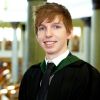
Joe Czajka
- Course: Linguistics and Phonetics
I began to develop a passionate interest in how language works when I studied English Language at AS and A level. Previously, English lessons had focused on literature, but learning about how children learn language left me fascinated. I decided that I wanted to study the mechanics of language in more detail and initially applied to a variety of English Language courses at various universities. Whilst doing this I noticed the Linguistics and Phonetics course provided by Leeds and realised that the linguistic aspect focused and expanded on all the topics that I enjoyed studying during my English Language A level, while omitting the aspects that bored me. Phonetics was also something that I had never studied before but seemed immensely interesting. The course seemed perfectly suited for my interests.
I chose Leeds because of the impression I received when visiting the University on an open day. The campus seemed much nicer than a lot of other universities that I had visited and the facilities were fantastic. The University of Leeds has one of the best student unions in the UK, beautiful libraries, great sports facilities and the campus is a five minute walk from the centre of Leeds. Leeds also offered a course that was the most tailor-made to my interests and I knew that I could expect an extremely high level of quality from such a prestigious university. Having finished my degree I can honestly say I don't regret my decision to study at Leeds one bit. The city is amazing and the University is fantastic.
The first year of modules provided a foundation for the course, by introducing students to the fundamental issues in the study of Linguistics and Phonetics. The programme of study in this year was divided between theoretical modules, which introduced us to the study of syntax, morphology, and phonology, as well as practical modules, which focused on issues concerning linguistic research. Although these modules didn't go into a great deal of detail with regards to one area of study, they did provide an insight into a variety of areas, which was very useful when deciding which second and third-year modules to take. There are plenty of modules to choose from in your second and third years, and having the foundation of knowledge provided by the first year definitely helped me decide which ones to take.
The modules I enjoyed the most were those that focused on phonetics and phonology. These modules look at how the human vocal tract is designed for language and at the science behind the production and perception of language. The lessons often mixed theory with practice, which I found a great way to learn. For example, producing the different sounds from the International Phonetic Alphabet (many of which we don't come across in English) was a great experience and really provided a greater appreciation for the information learnt in lectures about these sounds.
The teaching and support provided during my course was fantastic. I'm the type of student that likes to ask questions outside of lectures and my lecturers were always more than happy to answer any questions, even when I didn't make an appointment to see them and just knocked on their door. Lectures and seminars were information filled, but the information was always presented in an engaging way. A lot of study is required by the course, but very rarely did I find it tedious. I always wanted to learn more because I was so engaged in the lecture material.
Since I enjoyed studying phonetics and phonology in my second year, I decided to focus on this area for my dissertation. I investigated the relationship between phonetically simplified forms of the phrase I think and its meaning and function. A single word or phrase may have a range of spoken forms that differ with regards to phonetic features such as the place of articulation or voicing of particular sounds. This often indicates that the word or phrase has multiple meanings and functions, each of which is associated with its own subtly different pronunciation.
My dissertation drew on studies concerning the function of the phrase 'I think'. I wanted to see whether there is a clear relationship between the phonetic form of I think and its functional category. I used over 150 examples of I think taken from the Radio 4 show Any Questions?, and analysed various phonetic aspects of each phrase. I found that as the previous studies suggest, there is a strong relationship between the function of the phrase and the details of its pronunciation.
I plan to take a year out from study, in order to gain the work experience needed to study as a speech therapist. Having enjoyed my degree so much, I hope that speech therapy will further enhance my knowledge about how we produce language, whilst also providing the opportunity to help people. On a wider level, the degree has demanded a lot of hard work, high levels of organization and determination, as well as a high standard of written communication. I believe that all of these skills can be useful in a range of careers.

